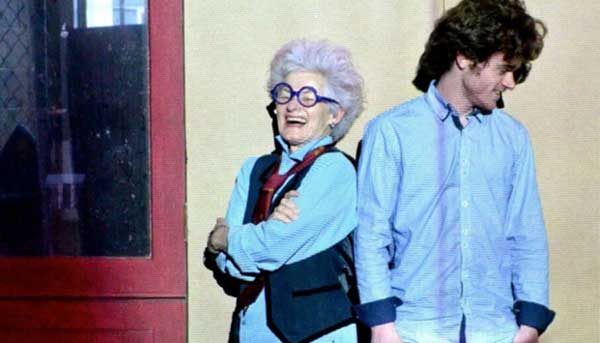Double-Bill, He Dreamed a Train and Eve at the Powerhouse
Much of my favourite theatre over the past year or so has been independent theatre at the Powerhouse (shout-out to Blue Bones and True West). Margi Brown-Ash’s double-bill, He Dreamed a Train and Eve, is no exception.
He Dreamed a Train
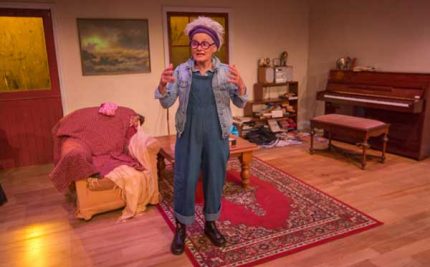
The first show is an exploration of grief as a woman clears out her brother’s house six weeks after his death. It is a simple story that effectively evokes the confusing and overwhelming mix of sadness, guilt, anger, frustration and happy memories that come at such emotional times.
This play was written by Margi Brown-Ash in the wake of her own brother’s death. It is intensely personal and I have great respect for the energy and courage Margi has thrown into it. Her performance is compelling and there were moments where it seemed she stopped playing a character and was just herself on stage. Her son, Travis Ash, plays the ghost/memory of her brother and while the two performers are often on stage together, their characters rarely exist in the same time/space. Instead, they seem to pass tantalisingly close to each other but remain just out of reach. This hammers home that ache you get when someone you love has died but it still feel like they are somehow there with you, while the brutal reality is they are not.
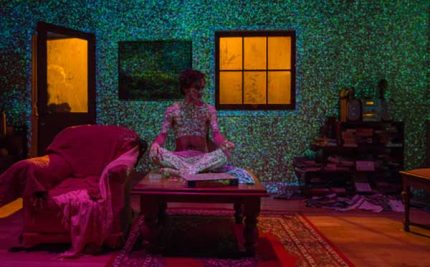
Turning to the production values of the show, I personally often dislike the use of projections. But He Dreamed a Train is an exception. The fabulous AV design by Benjamin Knapton and Nathan Sibthorpe allows the production to shimmer between reality and memory, capturing the all-encompassing, surreal state of raw grief when the death of a loved one is just too huge a thing to process. It enables the inner turmoil of the character to literally spill out and cover the environment she inhabits.
The sound design and piano music (designed and performed by Travis Ash) help bring both the discomfort and nostalgia of loss to life.
Eve
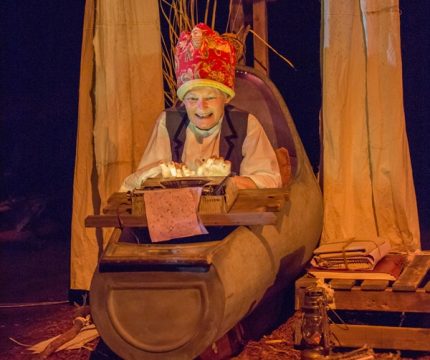
After an hour break to debrief, we go back for Eve. The second show draws from the extraordinary real life of author Eve Langley, a woman who refused to be bound by the sexist societal norms of the early 1900’s where a woman’s place was in the home. She believed she was the literary genius Oscar Wilde and dressed and behaved in a manner not befitting the domestic place of a woman. Eve was committed to a mental institution for seven years by her husband, essentially for her eccentric behaviour (i.e. not being a doormat) yet she somehow persevered with her writing.
The intertwining of Oscar Wilde’s children’s story ‘The Selfish Giant’ throughout this narrative brilliantly highlights the struggles women face as they are torn between the guilt of ‘selfishly’ wanting to work and the demands of family. It emphasises how quickly genius or ‘otherness’ can be labeled as madness and foregrounds the importance of staying true to yourself and your passions.
Again, this play is written by Margi and clearly is very personal. It had an initial incarnation in the early 90’s when she had small children of her own. Her performance as Eve is delightful as she displays infectious cheekiness, inspiring determination, understandable frustration, and confusion in a world where everything from publishers rejecting a manuscript, squalling children, and an unsupportive husband (that’s an understatement), seem against her and her dreams. Nevertheless, she persists with a spark in her eye.
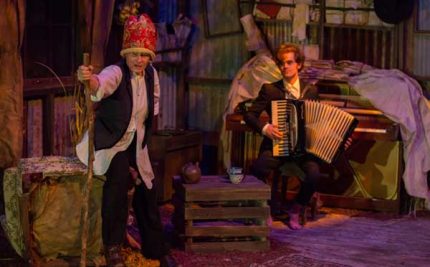
Aaron C Barton’s set is a beautiful rustic bush cabin made of corrugated iron, timber, and scattered with leaves, reflecting how the environment influenced her life. Coupled with Geoff Squires’ warm and inviting lighting design, it evokes romantic, almost magical notions of the Australian Bush, of poetry, of being an artist, and of being a determined free spirit.
Eve is a heartbreaking story of art, passion, identity, struggle and ultimately survival.
Together these two shows work beautifully as a double bill. Both exhibiting the poetry of Margi’s writing, they also allow the audience to see her excel as an actress of great versatility. It’s also lovely to see her working alongside her son, Travis Ash- certainly a great solution for the balance between motherhood and the life of an artist. These shows are both about belonging and the people or places that make us feel at home. You have until July 16 to catch both shows at the Brisbane Powerhouse.

